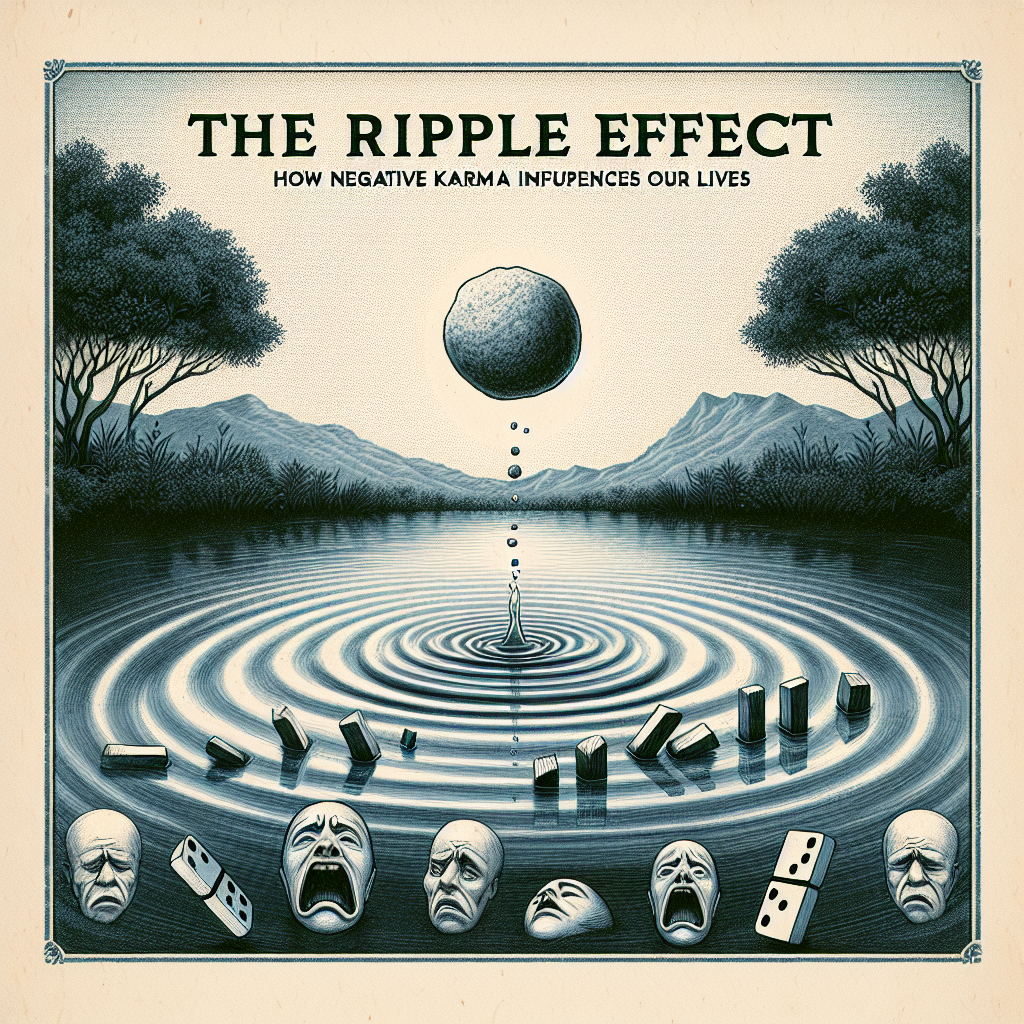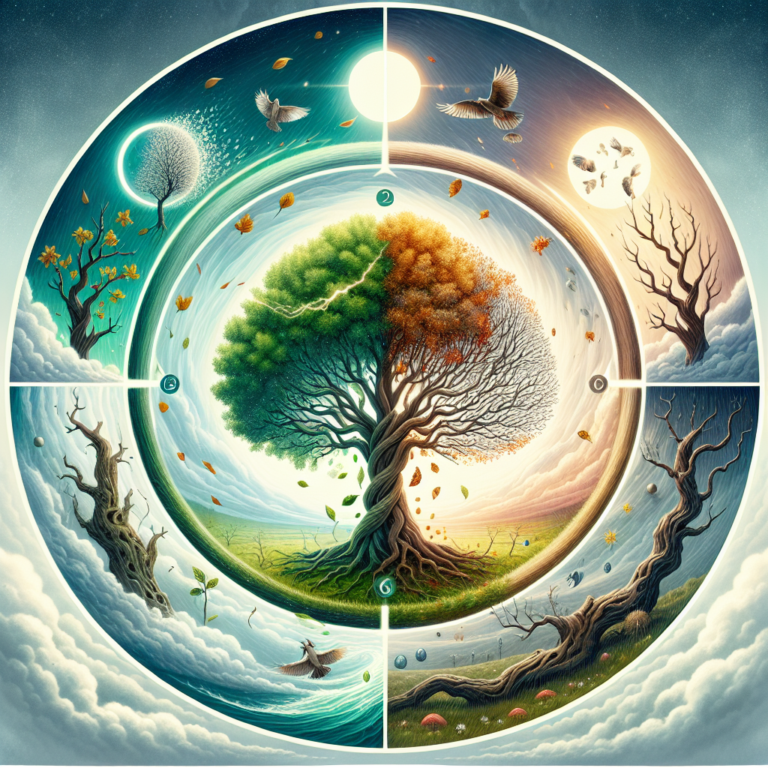The Ripple Effect: How Negative Karma Influences Our Lives
Karma, a concept rooted in Eastern philosophy, particularly in Hinduism and Buddhism, refers to the principle of cause and effect where an individual’s actions influence their future experiences. While the term ‘karma’ is often used in a lighthearted context in pop culture, its implications operate on a much deeper spiritual level. Negative karma, in particular, can create a ripple effect that extends far beyond individual actions, impacting not only the person who generated it but also their relationships, community, and the broader world.
Understanding Negative Karma
Before delving into how negative karma influences our lives, it’s crucial to understand what constitutes ‘negative karma’. It is derived from harmful actions, intentional or unintentional, that result in suffering or harm to oneself or others. This can manifest in various ways: through deceitful behavior, selfish acts, harboring negative thoughts, or engaging in harmful relationships. These actions can stem from ignorance, fear, or anger, but regardless of the motivation, the consequences rarely remain isolated.
The concept of karma suggests that every action has repercussions. Negative karma amplifies this idea; much like a stone thrown into a pond creates ripples that expand outward, negative actions create waves of consequences that affect multiple facets of our lives.
The Personal Impact of Negative Karma
Negative karma can directly impact personal well-being. Individuals might experience a range of emotional turmoil resulting from unaddressed past actions. Feelings of guilt, shame, or anxiety can spiral out of control if one does not take responsibility for their actions. The nagging weight of negative karma can lead to a person’s overall decline in mental health, robbing them of joy and peace.
The body and mind are intricately linked, and the accumulation of negative karma can lead to psychosomatic symptoms. Stress, tension, and unresolved emotional issues can manifest physically, causing ailments such as chronic pain, fatigue, and even serious medical conditions.
Moreover, negative karma can diminish the quality of relationships. Trust is paramount in any connection, and actions rooted in deceit or selfishness can erode this foundation. Once trust is broken, it takes a significant amount of work to repair the bond, and sometimes the damage is irreparable. The fallout can lead to a sense of isolation, leaving individuals in a spiral of negativity.
The Ripple Effect Outward
The consequences of negative karma extend beyond the individual. In a community, negative actions can trigger widespread mistrust and fear. For instance, a leader who engages in dishonest practices can create a culture of cynicism among their followers. The ramifications are pervasive; the once united community fragments, leading to a lack of collaboration and support among its members.
Families, too, are affected by the ripple effect of negative karma. Children who witness negative behavior may emulate it, perpetuating a cycle of harmful actions. When parents display toxic behavior, the next generation often absorbs these lessons, leading to an intergenerational transmission of negativity. As families are the building blocks of society, this cycle can contribute to broader societal issues, cementing a culture of conflict rather than harmony.
Breaking the Cycle
Understanding the implications of negative karma allows individuals and communities to take proactive steps to mitigate its effects. The first step in breaking the cycle is self-awareness. Acknowledging the negative patterns in behavior is essential for change. Reflective practices such as mindfulness and meditation can provide insight into one’s actions and thought processes.
Taking responsibility is also crucial. Apologizing to those who have been harmed and seeking to make amends can initiate a healing process. This not only serves the individual seeking redemption but also begins to mend the relationships that may have been damaged. When one displays accountability, it can inspire others to reflect on their actions as well.
Furthermore, practicing kindness and compassion can counterbalance negative karma. Engaging in acts of service, supporting others, and spreading positivity helps cultivate a more empathetic environment. It transforms the energy shifts within oneself and the community, fostering healing and connection rather than discord.
Spiritual Growth and Learning
From a spiritual perspective, confronting negative karma provides an opportunity for growth and learning. The process may be painful, but adversity often leads to profound self-discovery. It offers individuals a chance to reevaluate their values, purpose, and connection to the greater universe. By learning from past mistakes and making conscious efforts to improve, individuals can transform negative experiences into profound lessons.
The journey of addressing negative karma is heavily tied to personal development. Life becomes a continuum of growth where every experience, even suffering, contributes to a richer understanding of oneself and others. This perspective transforms life’s challenges into stepping stones for enlightenment.
FAQs
What is Karma?
Karma is a principle of cause and effect that suggests every action has consequences, influencing an individual’s future experiences and circumstances.
What is negative karma?
Negative karma arises from harmful actions, thoughts, or behaviors that result in suffering for oneself or others, creating a cycle of negative consequences.
How does negative karma affect relationships?
Negative karma can erode trust and create distance in relationships, leading to emotional pain and isolation. It can perpetuate cycles of negative behavior across generations.
How can one break the cycle of negative karma?
Self-awareness, taking responsibility for past actions, practicing kindness and compassion, and engaging in reflective practices can help break the cycle of negative karma.
Can negative karma be transformed into positive karma?
Yes, by acknowledging past mistakes, seeking to make amends, and consciously choosing positive actions, individuals can transform negative karma into positive experiences and growth.
Is negative karma permanent?
While it can have lasting effects, individuals have the power to change their actions and thoughts, which can alter their karmic journey. Growth and healing can redefine one’s path forward.
In conclusion, understanding the ripple effect of negative karma sheds light on the interplay of personal actions and broader societal implications. It encourages individuals to reflect, learn, and engage in a path toward healing, fostering a more compassionate and connected world.
It looks like you might be looking for a prompt or suggestion for a creative task. Could you please provide more details about what you need? For example, are you looking for a writing prompt, art idea, discussion topic, or something else? Let me know how I can help!, #Ripple #Effect #Negative #Karma #Influences #Lives, #Ripple #Effect #Negative #Karma #Influences #Lives, 1736542700, the-ripple-effect-how-negative-karma-influences-our-lives





